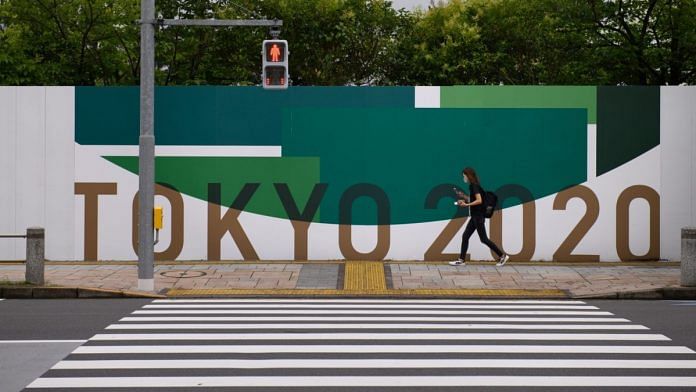New Delhi: The Summer Olympics are finally set to begin in Tokyo on 23 July, a year after they were postponed due to the Covid-19 pandemic.
The Games are set to begin despite the much prevalent public opposition as Japan’s Covid cases continue to rise. But the Games will be held under strict Covid protocols.
ThePrint looks at what is different about the Olympics and India’s contingent for the Games.
New rules & restrictions for these Olympics
Tokyo entered a state of emergency on 12 July as a precautionary measure ahead of the Games. The Olympic Games Committee announced that spectators would be banned from almost all the venues, with organisers encouraging local fans to watch at home.
According to the new rules, in venues where spectators are allowed, fans are barred from cheering, shouting, singing, or whistling to prevent transmission through exposure to respiratory droplets.
The set of rules for pandemic appropriate behaviour also states that fans must maintain as much distance as possible from each other.
While the Games end on 8 August, the state of emergency in Tokyo will last until 22 August, which is shortly before the Paralympics will begin.
As for athletes, they will have to undergo daily testing, according to the new rules. Athletes and support staff are also required to take two Covid tests on two separate days, within 96 hours of their flight to Japan.
All individuals entering the Olympic and Paralympic Village or Games venue will have to get their temperature checked each time and those who have Covid-19 symptoms or those recently tested positive for Covid will be refused entry.
All individuals must also get Covid negative test results with them to Japan. If someone does test positive or has symptoms in the 14 days prior to their trip, then they have to immediately self-isolate.
In all, 205 countries will be participating, down from 207 in the 2016 Rio Olympics.
Among the famous names competing is gymnast Simone Biles, tennis players Naomi Osaka and Novak Djokovic, swimmer Katie Ledecky, Syrian table tennis player Hend Zaza, and basketball player Kevin Durant.
Tennis stars Rafael Nadal and Roger Federer have opted out of the Olympics due to injuries, while British long-distance runner Mo Farah failed to qualify and will not be able to defend his 10,000-metre title.
Also read: How to get 11,000 athletes from 200 countries to Tokyo for Olympics in 16 days amid Covid?
India at the Games
India is sending a total of 126 athletes across 18 sporting categories. Coaches, support staff, and officials take that number up to 227, making it the largest contingent that India has sent to the Games.
The Indian Olympic Association has announced that six-time world champion boxer M.C. Mary Kom and captain of the Indian men’s hockey team, Manpreet Singh, will be India’s flag bearers at the opening ceremony. Wrestler Bajrang Punia will be the flag bearer at the closing ceremony on 8 August.
Speaking to ThePrint, Manpreet Singh explained that when the Olympics were initially postponed, everyone’s morale was down but the team found different ways to stay positive.
“The Olympics is every athlete’s main goal, so it was initially a bit difficult but we managed,” he said. “Our mindset going into the Olympics is a podium finish, but we are taking it step-by-step, one match at a time.”
The Indian contingent will also include shuttler P.V. Sindhu and Bhavani Devi, who is the first Indian fencer to qualify for the Olympics, table tennis player Manika Batra, swimmer Sajan Prakash, Sania Mirza and Ankita Raina for women’s tennis in the double’s category, boxer Amit Panghal, and Dutee Chand in athletics, among others.
In the 2016 Olympics at Rio, of the 117 athletes sent, India won only two medals at the Games. One was a silver by Sindhu and the other was a bronze medal by wrestler Sakshi Malik.
This time, hopes are pinned on Sindhu, archer Deepika Kumari, pugilist Amit Panghal and shooter Saurabh Chaudhary.
India will be competing in fencing and sailing for the first time. After hockey, athletics has the highest contingent of Indian athletes — 25, 8 women, and 17 men.
A postponed Olympics
Since the first modern Olympic Games were held in 1896, the Olympics were cancelled only on three occasions, all due to World Wars. These were in the years 1916, 1940, and 1944.
In the 1920 Olympic Games in Belgium, Germany was disinvited and was blamed for starting World War 1.
Forty-eight years later in 1968, 10 days before the Olympic Games in Mexico, government forces opened fire on crowds of unarmed protestors in what came to be known as the Tlatelolco Massacre.
One of the most controversial Games and what is known as one of the darkest chapters of Olympic history was the 1972 Munich Olympics. In 1972, armed Palestinians associated with the militant group Black September stormed the Olympics Games village and attacked the Israeli compound where they killed 11 Israelis, first killing two and then holding nine hostage, who were later murdered in the ensuing stand-off.
(Edited by Arun Prashanth)
Also read: For isolated athletes, Tokyo Olympics promises to be the weirdest ever games



